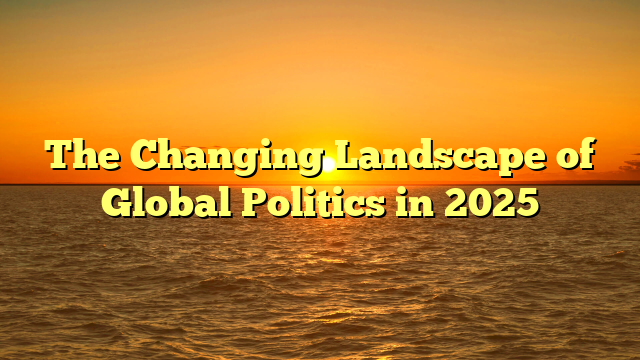
bengkulutoto in 2025 continues to evolve rapidly, influenced by shifting alliances, economic uncertainties, and growing technological advancements. Nations across the globe are grappling with challenges such as geopolitical conflicts, climate policies, and the role of artificial intelligence in governance. As world leaders navigate these complex issues, their decisions will shape the future of international relations, economic stability, and global security.
Rising Geopolitical Tensions
One of the most pressing political developments this year has been the escalation of geopolitical tensions in key regions. Relations between major world powers remain fragile, with disputes over territorial claims, trade policies, and military influence.
In Eastern Europe, tensions between NATO and Russia continue to be a focal point of international concern. The conflict in Ukraine remains unresolved, despite diplomatic efforts and economic sanctions imposed on Russia. The situation has led to increased military spending in Europe, with countries strengthening their defense capabilities to deter potential threats. Meanwhile, China’s growing influence in the Indo-Pacific region has raised alarms among Western nations, leading to stronger military partnerships such as the AUKUS alliance (Australia, the United Kingdom, and the United States).
At the same time, the Middle East remains a hotspot for political instability. Ongoing conflicts in the region, particularly in Syria and Yemen, have led to humanitarian crises and displaced millions of people. Diplomatic efforts to broker peace deals are ongoing, but achieving long-term stability remains a significant challenge.
The Impact of Economic Policies
Global economies are recovering from the disruptions caused by the COVID-19 pandemic and subsequent inflation crises. Governments have implemented various policies to stabilize their economies, but challenges persist.
The United States has introduced new economic reforms aimed at boosting domestic production and reducing reliance on foreign supply chains. However, concerns about inflation and rising interest rates continue to affect consumer confidence. In Europe, debates over energy policies and the transition to renewable resources have sparked political divides, particularly as nations seek to balance economic growth with environmental responsibilities.
Meanwhile, China’s economy has experienced slower growth due to regulatory crackdowns on its technology sector and real estate market struggles. This slowdown has had ripple effects on global markets, particularly for countries that rely on trade with China. Developing nations, especially in Africa and Latin America, are facing economic uncertainty as they navigate debt crises and seek foreign investment for infrastructure projects.
The Role of Artificial Intelligence in Politics
Artificial intelligence (AI) is playing an increasingly significant role in politics, from shaping public opinion to influencing policy decisions. Governments are now leveraging AI-powered tools for data analysis, cybersecurity, and even law enforcement. However, the use of AI in governance raises ethical concerns about privacy, surveillance, and potential bias in decision-making processes.
Misinformation and deepfake technology have also become major political challenges. With the rise of AI-generated content, distinguishing between real and fake news has become more difficult, making political campaigns and public trust in media more vulnerable to manipulation. Governments and tech companies are under pressure to regulate AI-driven misinformation while ensuring freedom of speech is not compromised.
Climate Policies and Global Commitments
Climate change remains a top priority on the political agenda, with governments facing increasing pressure to take action. The 2025 United Nations Climate Summit highlighted the urgency of reducing carbon emissions, transitioning to renewable energy, and addressing climate-related disasters.
Countries have set ambitious targets for achieving net-zero emissions, but implementation remains a challenge. Developing nations argue that wealthier countries should provide financial and technological support to help them transition to green energy. Meanwhile, debates over fossil fuel dependency continue, as some economies still rely heavily on oil and gas production.
Despite political divides, there have been positive steps toward environmental sustainability. Many nations have invested in clean energy projects, electric vehicle infrastructure, and reforestation efforts. However, climate activists argue that governments must act faster to prevent irreversible environmental damage.
Elections and Shifting Political Landscapes
2025 is a significant year for global elections, with several major countries holding national votes that could reshape political landscapes.
In the United States, the presidential election is a highly contested event, with candidates debating key issues such as healthcare, immigration, and economic policies. The outcome will determine the country’s direction on both domestic and foreign affairs.
European elections are also drawing attention, as right-wing and populist movements gain traction in some countries, while others push for more progressive policies. The European Union faces internal challenges, including Brexit-related trade agreements and the rise of nationalist movements that oppose deeper integration.
In Latin America, political shifts continue as new governments take power, with a focus on economic recovery, social reforms, and anti-corruption efforts. Meanwhile, African nations are seeing increased voter participation as younger generations demand greater political transparency and economic opportunities.
Conclusion
The political landscape in 2025 is marked by complexity and rapid change. Geopolitical tensions, economic policies, AI advancements, climate commitments, and elections are shaping the future of governance worldwide. As leaders navigate these challenges, their decisions will have lasting impacts on global stability, security, and prosperity. While political divisions remain, international cooperation and diplomacy will be crucial in addressing the world’s most pressing issues.





